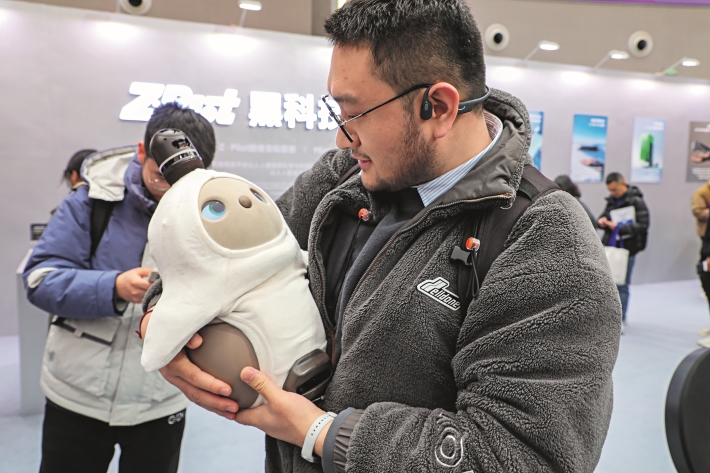Igniting the Engine


Vigorous discussions surrounding DeepSeek’s artificial intelligence (AI) models, which began early this year, continued at the Two Sessions - the annual meetings of the National People’s Congress (NPC) and the National Committee of the Chinese People’s Political Consultative Conference (CPPCC) - held from 4 to 11 March. It shows how China is rapidly growing into a vast market for AI technologies, with cutting-edge innovations increasingly integrated across various sectors of the economy.
NPC deputies, CPPCC National Committee members, and observers alike lauded the progress in the AI sector, and discussed AI’s many facets - from its boundless applications across diverse fields and its potential for growth to the safety concerns and pivotal role in international cooperation. The discussions demonstrate China’s commitment to this emerging field, reflecting broader efforts to pursue high-quality development.
In support of China’s AI Plus initiative, this year’s government work report delivered by Premier Li Qiang aims to expand the use of large-scale AI models while aggressively developing next-generation intelligent terminals and smart manufacturing equipment. These include connected new-energy vehicles, AI-enabled phones and computers, and intelligent robots.
Embracing breakthroughs
DeepSeek has been at the centre of these discussions. At a press conference held on 4 March, spokesperson for the third session of the 14th NPC Lou Qinjian stated that the significant progress made by DeepSeek represents the rise of Chinese companies in the AI field, praising the teams behind the model for advancing China’s science and technology.
He noted that DeepSeek’s open-source approach promotes the universal application of AI worldwide and contributes Chinese wisdom to global innovation, showcasing the nation’s commitment to inclusiveness in scientific and technological development.
According to a recent report by China Centre for Information Industry Development, China’s advantages in the AI sector stem from its focus on meeting domestic market demand, while the US prioritises technological innovation and Europe emphasises the formulation of standards. “Though not far ahead globally, China is more active in applying AI in numerous scenarios - not only in industry, but also in culture and government affairs,” said Cui Yan, an NPC deputy and founder of tech firm 4DAGE.
Cui noted that the successful integration of technological innovations with industrial development is upgrading and transforming traditional industries, ushering in unprecedented opportunities. The rapid, low-cost deployment of large-model technology based on DeepSeek offers valuable opportunities for industrial innovation, particularly for small and medium-sized enterprises.
Cui’s team has been committed to AI-based three-dimensional digitalisation, and has provided technical support to the restoration and preservation of nearly 10,000 cultural relics. They have also applied AI technology in fields such as digital display and public safety. “All sectors can benefit from integrating AI,” he observed.
Citing DeepSeek as a successful case, Liu Tsee Ming, a CPPCC National Committee member and chairman of Elite Industrial Holdings Ltd., attributed the rapid development of China’s high-tech sectors, including AI, to the inherent advantages of private enterprises in research and development. He noted that private companies benefit from quick decision-making and flexible management, allowing them to quickly respond to emerging opportunities and allocate resources efficiently to R&D. Additionally, their ability to attract top talent with competitive salaries and good work environments further bolsters their comparative advantages in technology research and development.
The private sector plays a pivotal role in driving China’s innovation efforts, accounting for more than 92 percent of its high-tech enterprises and over 70 percent of its technological innovation achievements. At a symposium on private enterprises held in Beijing on 17 February, which included leaders of high-tech firms such as DeepSeek founder Liang Wenfeng, Chinese President Xi Jinping stressed the role of private companies in advancing technological innovation. He reiterated his unwavering commitment to the private sector, noting that the fundamental policies for the development of the private economy have been incorporated into the national institutional system and that “this cannot and will not change.”

Filling technological gaps
China’s AI development has also been a hot topic among international observers during and after the Two Sessions. A key area of discussion is how China’s AI sector can benefit the rest of the world, particularly the Global South countries.
Daan du Toit, deputy director general of international cooperation and resources at South Africa’s Department of Science and Innovation - and a DeepSeek app user - stated that DeepSeek’s AI models are both remarkable and crucial for the Global South because they offer affordable access to advanced technology for countries with limited resources. He emphasised the significance of the models being open-source.
“That is the way China believes innovation should progress - to benefit all. That creates great opportunities for scientists and innovators from the Global South to work with China,” he told ChinAfrica.
Yvonnie Akonda Sundu, a Malawian media and communications expert, highlighted the potential impact of China-Africa collaboration in AI. “I believe China-Africa collaboration in AI is expected to drive innovation, economic growth, and digital transformation across the continent. Key impact areas include AI governance, where China’s expertise in AI and AI governance will promote the development of robust AI regulations, ensuring the responsible use of AI technologies across the continent.”
Addressing the challenges associated with AI is a key part of China’s agenda. Legislation has been introduced to protect data privacy and security, and the government has launched the Global Artificial Intelligence Governance Initiative to foster an open, inclusive, and fair approach to the development, security, and governance of emerging AI technologies and services.
“China is willing to work with all countries in the world to continue to promote the healthy development of AI, promote world economic growth, and enhance the well-being of people in all countries,” said Lou at the press conference on 4 March.


